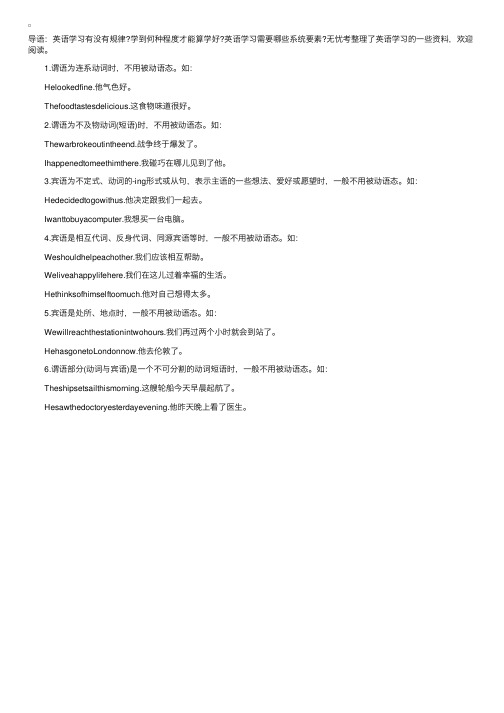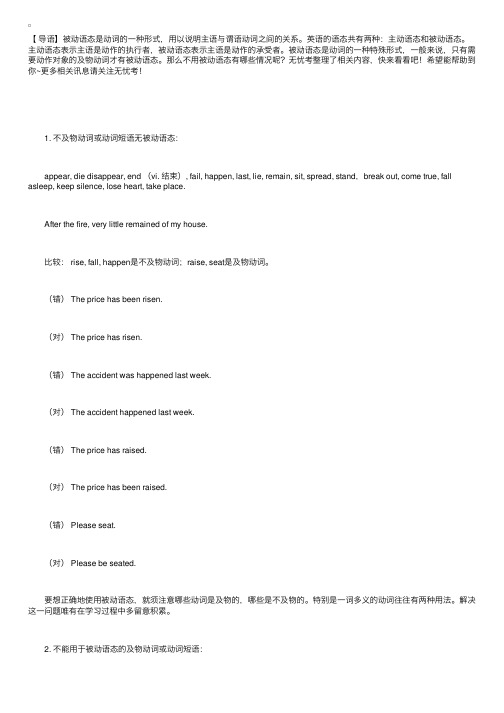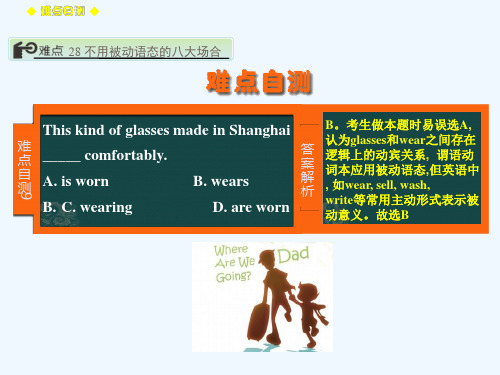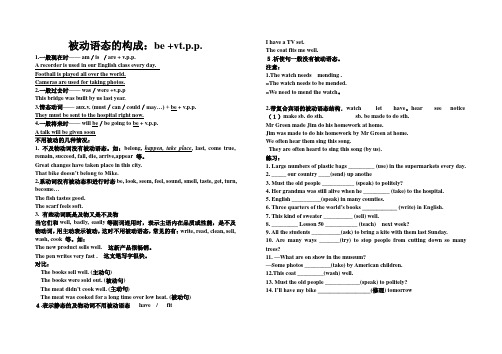不用被动的一些情况
英语不能用被动语态的情况

不能用被动语态的情况初中语法:1) 不及物动词或动词短语无被动语态:appear, die disappear, end (vi. 结束), fail, happen, last, lie, remain, sit, spread, stand break out, come true, fall asleep, keep silence, lose heart, take place.After the fire, very little remained of my house.比较:rise, fall, happen是不及物动词;raise, seat是及物动词。
(错) The price has been risen.(对) The price has risen.(错) The accident was happened last week.(对) The accident happened last week.(错) The price has raised.(对) The price has been raised.(错) Please seat.(对) Please be seated.要想正确地使用被动语态,就须注意哪些动词是及物的,哪些是不及物的。
特别是一词多义的动词往往有两种用法。
解决这一问题唯有在学习过程中多留意积累。
2) 不能用于被动语态的及物动词或动词短语:fit, have, hold, marry, own, wish, cost, notice, watch agree with, arrive at / in, shake hands with, succeed in, suffer from, happen to, take part in, walk into, belong to This key just fits the lock.Your story agrees with what had already been heard.3) 系动词无被动语态:appear, be become, fall, feel, get, grow, keep, look, remain, seem, smell, sound, stay, taste, turnIt sounds good.4) 带同源宾语的及物动词,反身代词,相互代词,不能用于被动语态:die, death, dream, live, lifeShe dreamed a bad dream last night.5) 当宾语是不定式时,很少用于被动语态。
不用被动语态的N种情况

不用被动语态的N种情况1.不及物动词不能用于被动语态。
例如:太阳冉冉升起。
当这件事情发生?2.表示状态特征的系动词,如look、sound、feel、smell、taste、appear、seem、go、prove、turn、e、fall、get、grow、keep等的主动形式表示被动意义。
例如:听起来很好。
3.表示开始、结束、运动的动词不用于被动语态。
这类动词有begin、start、finish、open、close。
end、shut、run、XXX等。
例如:课程在8点开始。
4.read、write、wash、sell、wear、lock等动词和well、easily、XXX等连用时,主动形式表示被动意义。
例如:这支笔书写流畅。
这件外套容易洗涤。
5.一部分动词用进行时表示被动意义。
这类动词有print、cook、fry、hang、build、make等。
例如:这本小说正在印刷。
晚餐正在烹饪中。
6.need、want、require、deserve等动词以物做主语时,后接动名词的主动形式表示被动意义。
我的手表需要修理。
谁说那男孩应该受到惩罚。
7.宾语是反身代词、相互代词、同源宾语时,不用被动语态。
例如:我自学英语。
我们互相帮助。
他们过着幸福的生活。
8.一部分及物动词不用于被动语态。
常见的有:fit、have、wish、cost、leave、enter、reach、suit、benefit(受益)、lack、own等。
例如:他走进房间并拿起了他的书。
我有一本书。
Some phrasal verbs cannot be used in passive voice。
such as breakout。
take place。
lose heart。
come true。
belong to。
consist of。
add up to。
agree with。
arrive at/in。
shake hands with。
不用被动语态的N种情况

不用被动语态的N种情况在英语写作中,被动语态常常被用来强调动作的接收者。
然而,在有些情况下,使用主动语态可以更加简洁和直接。
以下是几种不用被动语态的情况:1. 目的不明确或不重要的情况当目的不明确或不重要时,使用主动语态可以更加简洁。
例如:- "The room was cleaned by someone." 可以改为 "Someone cleaned the room."- "The car was parked by a stranger." 可以改为 "A stranger parked the car."2. 动作的执行者已知或可以明确指出的情况如果动作的执行者已知或可以明确指出,使用主动语态可以更加直接。
例如:- "The report was written by John." 可以改为 "John wrote the report."- "The cake was baked by my mother." 可以改为 "My mother baked the cake."3. 动作执行者不重要的情况当动作执行者并不重要时,使用主动语态可以更加简洁。
例如:- "The package was delivered yesterday." 可以改为 "The package arrived yesterday."- "The decision was made last week." 可以改为 "The decision was taken last week."4. 强调动作执行者的情况有时候,我们希望强调动作执行者,使用主动语态可以更加有效。
例如:- "The painting was created by Picasso." 可以改为 "Picasso created the painting."不过需要注意的是,有些情况下使用被动语态可以更准确地表达意思。
英语中不用被动语态的几种情况

导语:英语学习有没有规律?学到何种程度才能算学好?英语学习需要哪些系统要素?⽆忧考整理了英语学习的⼀些资料,欢迎阅读。
1.谓语为连系动词时,不⽤被动语态。
如: Helookedfine.他⽓⾊好。
Thefoodtastesdelicious.这⾷物味道很好。
2.谓语为不及物动词(短语)时,不⽤被动语态。
如: Thewarbrokeoutintheend.战争终于爆发了。
Ihappenedtomeethimthere.我碰巧在哪⼉见到了他。
3.宾语为不定式、动词的-ing形式或从句,表⽰主语的⼀些想法、爱好或愿望时,⼀般不⽤被动语态。
如: Hedecidedtogowithus.他决定跟我们⼀起去。
Iwanttobuyacomputer.我想买⼀台电脑。
4.宾语是相互代词、反⾝代词、同源宾语等时,⼀般不⽤被动语态。
如: Weshouldhelpeachother.我们应该相互帮助。
Weliveahappylifehere.我们在这⼉过着幸福的⽣活。
Hethinksofhimselftoomuch.他对⾃⼰想得太多。
5.宾语是处所、地点时,⼀般不⽤被动语态。
如: Wewillreachthestationintwohours.我们再过两个⼩时就会到站了。
HehasgonetoLondonnow.他去伦敦了。
6.谓语部分(动词与宾语)是⼀个不可分割的动词短语时,⼀般不⽤被动语态。
如: Theshipsetsailthismorning.这艘轮船今天早晨起航了。
Hesawthedoctoryesterdayevening.他昨天晚上看了医⽣。
动词的时态、语态练习-2022届高考英语二轮专题

动词的时态、语态真题演练一、被动语态的结构时态被动语态现在完成时的标志词一般现在时一般过去时一般将来时过去将来时现在进行时过去进行时现在完成时过去完成时情态动词二、不用被动语态的情况:1.The food tasted better than it looked.2.My new pen writes well.3.The question is difficult to answer.4.The film is well worth seeing.5.The policy is partly to blame for causing the worst unemployment in Europe.6.The carpet really needs cleaning (= to be cleaned).7.The biggest earthquake took place in 2008.8.The medical team consists of 5 doctors and 10 nurses.三、高考链接1.The musician along with his band members _____________________(give) ten performancesin the last three months.2. A few months after he had arrived in China, Mr. Smith ___________(fall) in love with thepeople and culture there.3.They are trying to make sure that 5G terminals___________________(install) by 2022 for theBeijing Winter Olympics.4.Amy, as well as her brothers, ________________(give) a warm welcome when returning to thevillage last week.5.Picking up her“Lifetime Achievement”award,proud Irene (declare) she hadno plans to retire from her 36-year-old business.6.I don't see any reason to give up work. I love coming here and seeing my family and all thefriends I ____________(make) over the years.7.On the last day of our week-long stay,we _______________(invite) to attend a private concerton a beautiful farm on the North Shore under the stars8.China’s high-speed railways _________________(grow) from 9,000 to 25,000 kilometers inthe past few years.9. A rescue worker risked his life saving two tourists who __________________(trap) in themountains for two days.10.My washing machine ___________this week, so I have to wash my clothes by hand.11.Hopefully in 2025 we will no longer be e-mailing each other, for we___________________(develop) more convenient electronic communication tools by then. 12.I was sent to the village last month to see how the development plan _____________________(carry) out in the past two years.13.The Chinese Ministry of Agriculture finds that between 2005—when the government _______(start) a soil-testing program which gives specific fertilizer recommendations to farmers - and 2011, fertilizer use dropped by 7.7 million tons.14.I ____________(drive) down to London when I suddenly found that I was on the wrong road.15.He hurried home, never once looking back to see if he _________________________(follow).16.In the 1950s in the USA, most families had just one phone at home, and wireless phones__________________(invent) yet.17.Nowadays, cycling, along with jogging and swimming, __________________(regard) as oneof the best all-round forms of exercise.18.—Excuse me, which movie are you waiting for?—The new Star Wars. We _______________________(wait) here for more than two hours. 19.The students have been working hard on their lessons and their efforts ____________________(reward) with success in the end.20.More efforts, as reported, ___________________(make) in the years ahead to accelerate thesupply-side structural reform.21.Dashan, who_______________________(learn) crosstalk, the Chinese comedic tradition, fordecades, wants to mix it up with the Western stand-up tradition.22.Silk ____________(become) one of the primary goods traded along the Silk Road by about 100BC.23.The Xi'an City Wall _____________ (build) originally to protect the city during the Tangdynasty and has now been completely restored.24.The little home _________________ (paint) white. It was sweet and fresh. Mary loved it.答案:一.被动语态的结构时态 主动语态 被动语态 现在完成时的标志词一般现在时 do/ does am/is /are done Recently;already;yet ;ever since;so far; for+一段时间;in+一段时间;by+一段时间,over+一段时间等。
没有被动语态的动词

没有被动语态的动词一;常见的look 看起来,sound 听起来,taste 尝起来,smell 闻起来,feel感到,go 变得,grow 变得等;二、一些不能接宾语的动词短语也没有被动语态;1.The war broke out in 1937.break out,爆发2.The story took place in a small mountain village.发生,take place三、甚至有些及物动词和可以接宾语的动词短语要看他们作什么意思讲,有时也只能有主动语态而不宜于用被动语态;1.We have six classes every day. have,上课2.The hall can hold more than 500 people. held,容纳3.The project lasted 14 years and cost I billion US st,延续4.No dish suits all tastes. suit,适合类似的还有fit ,catch ,get ,take ,own ,meet 等;四、而有些动词和短语兼有及物和不及物两种用法,所以前者有被动语态,而后者没有;1.He serves in the Navy Department. 服役,不及物2.Hamburger is served in this restaurant. 供应,及物3.The plane toke off at eight last night. 起飞,不及物类似的还有look into 作往里看,不及物;作调查、研究,及物look up 作好转,不及物;作查阅,及物等;五、而如果及物动词后的宾语是反身代词,相互代词;或者宾语前面有和主语同一人物的物主代词;或者是同源宾语的动词,也常常不能转换为被动语态;例如:1.The thief hid himself behind the door . 宾语为反身代词2.We should learn from each other. 宾语为相连代词六、带宾语从句的句子常常没有被动语态1.Marx found that his English was too limited.2.I don’t know where he lives.但是,如果主句的谓语动词是believe ,say ,know ,report 等,且宾语从句是由that ,whether引起的,则常可以用It is believed say ,know ,report that whether 的句型;七、有些及物动词有其习惯性用法,常用主动代替被动:1.It is a pretty material ,but it doesn’t wash.比较:My shirt is usually washed by myself.2. The new Ford is selling badly.比较:All newspapers have been sold out.类似的还有clean ,lock ,write ,play ,start ,cut等;八、最后要说的是另一种情况:英语中有不少动词及动词短语常用被动形式来表示主动的含义;1.Be seated, please2.We must be prepared for the worst.类似的还有be determined to ,be absorbed in , be gone , be married to , behi dden , be interested in ……and advanced mathematics ,experienced school , learned man 等中这些定语用的过去分词也是用过去分词表主动;I dreamed a good dream.我做了一个好梦一般不会说A good dream was dreamed.AS的基本用法as ... as用于比较句型,中间插入的是形容词或副词的原级;意思是"达到与什么相同的程度";如:He is as strong as a horse. 他力大如牛;二、习惯用法1. as soon as意思是"一......就......",引导一个时间状语从句;如:I'll call you as soon as I finish my homework. 我一完成我的作业,就给你打电话;2. as long as意思是"长达......之久;只要......";如:She has searched the information about dinosaurs on the Internet as long as three hours. 她在因特网上搜索有关恐龙的信息已经长达三个小时;3. as much as意思是"高达......;与......一样多";是用来表达极其多的语气;如:Some of the stones weigh as much as fifteen tons.有些石头重达15吨;★as...as用法:as...as意为"和……一样",表示同级的比较;使用时要注意第一个as为副词,第二个as为连词;其基本结构为:as+ adj./ adv. +as;例如:1This film is as interesting as that one.这部电影和那部电影一样有趣;其否定式为not as/so +adj./ adv. +as;例如:This dictionary is not as/so useful as you think.这本字典不如你想象的那样有用; 若有修饰成分,如twice, three times, half, a quarter等,则须置于第一个as之前;例如:Your bag is twice as expensive as mine.你的袋子比我的贵一倍;几个关于as...as的常见句型:1as...as possiblePlease answer my question as soon as possible.请尽快回答我的问题;2as...as usual/beforeShe looks as pretty as before.她看起来和以前一样漂亮;3as long as... 引导条件状语从句It took us as long as three years to carry out the plan.我们花了长达三年的时间才完成这项计划;4as far asHe walked as far as the railway station yesterday evening.昨天傍晚,他一直散步到火车站;5as well asShe cooks as well as her mother does.她烧菜烧得跟她母亲一样好;★as...as的结构:as + 形容词或副词原级 + as1在否定句或疑问句中可用so… as;He cannot run so/as fast as you.2当as… as 中间有名词时采用以下格式;as +形容词+ a +单数名词as + many/much +名词This is as good an example as the other is.I can carry as much paper as you can..3用表示倍数的词或其他程度副词做修饰语时,放在as的前面;This room is twice as big as that one.Your room is the same size as mine.4 倍数+ as + adj. + as <=> 倍数+ then + ofThis bridge is three times as long as that one.This bridge is three times the length of that one.Your room is twice as large as mine.Your room is twice the size of mine.。
初中英语语法大全:不用被动语态

初中英语语法大全:不用被动语态各位读友大家好,此文档由网络收集而来,欢迎您下载,谢谢初中英语语法大全:不用被动语态不用被动语态的情况1) 不及物动词或动词短语无被动语态:appear, die disappear, end , fail, happen, last, lie, remain, sit, spread, stand break out, come true, fall asleep, keep silence, lose heart, take place.After the fire, very little remained of my house.比较:rise, fall, happen是不及物动词;raise, seat是及物动词。
The price has been risen.The price has risen.The accident was happened last week.The accident happened last week.The price has raised.The price has been raised.Please seat.Please be seated.要想正确地使用被动语态,就须注意哪些动词是及物的,哪些是不及物的。
特别是一词多义的动词往往有两种用法。
解决这一问题唯有在学习过程中多留意积累。
2) 不能用于被动语态的及物动词或动词短语:fit, have, hold, marry, own, wish, cost, notice, watch agree with, arrive at / in, shake hands with, succeed in, suffer from, happen to, take part in, walk into, belong toThis key just fits the lock.Your story agrees with what had already been heard.3) 系动词无被动语态:appear, be become, fall, feel, get,grow, keep, look, remain, seem, smell, sound, stay, taste, turnIt sounds good.4) 带同源宾语的及物动词,反身代词,相互代词,不能用于被动语态:die, death, dream, live, lifeShe dreamed a bad dream last night.5) 当宾语是不定式时,很少用于被动语态。
不用被动语态的八大场合

◆
◆
28 不用被动语态的八大场合
— What do you think of my composition?
辨
示动作;系表结构中的过去分词相当于
析
形容词,表示状态。
I found the whole yard was covered with snow.
例
(系表结构)
句
The highway was covered by the snow and had to be closed. (被动语态)
◆
◆
28 不用被动语态的八大场合
四
to, last等不用于被动语态。
Gulf War broke out on January 17, 1991.
例
句
1991年1月17日,海湾战争爆发。
◆
◆
28 不用被动语态的八大场合
表示状态或特征的及物动词, 如contain,
场
合
hold, cost, fit, have, lack, resemble, suit
一
C. belonged to D. belongs to
案为D。
典 型 例 题 二
This kind of ice cream _____ like a
D。系动词sound , smell , feel , taste, look等后跟名
combination of banana and straw- 答 词、形容词等时, 往往用
接
为被动语态时不可去掉构成动词短语的介
词或副词。
We can’t laugh at him.
例
→He can’t be laughed at by us.
不用被动语态的五种情况

不用被动语态的五种情况一、主动语态与被动语态的区别在英语中,主动与被动语态是用来表达动作的执行者和承受者的不同关系。
主动语态强调执行动作的主体,而被动语态则强调动作的承受者。
举个例子: - 主动语态:Tom ate an apple. - 被动语态:An apple was eaten by Tom.主动语态中,动作的执行者是Tom,他是动作的主体;而被动语态中,动作的承受者是an apple,它成为动作的主语,而Tom成为介词by的宾语。
二、主动语态的使用场景主动语态在英语中是最常用的语态形式,它直接表达了动作的执行者和行为,更加简洁明了。
同时,使用主动语态还可以提高句子的流畅度和表达的准确性。
下面将探讨五种情况下主动语态的使用场景。
2.1 表达动作的执行者是重要信息在某些情况下,动作的执行者是信息的重要组成部分,使用主动语态可以直接明确表示。
例如,当我们强调主语的身份时,主动语态通常会更加合适。
例子: - The CEO announced the new company policy. - Our team won the championship.2.2 强调动作的进行方法主动语态可以更加清晰、直接地描述动作的进行方法,表述起来更加生动活泼。
在这种情况下,使用主动语态可以更好地突出这一点。
例子: - She painted a beautiful picture. - The chef cooked the meal with great skill.2.3 描述习惯性行为或普遍真理当我们需要表达习惯性行为或普遍真理时,主动语态是更为常见的选择。
被动语态在这种情况下显得多余且不必要。
例子: - People need food and water to survive. - Birds build nests to lay eggs.2.4 表述感受、兴趣和态度主动语态可以更好地表达人们的感受、兴趣和态度。
英语语法:不用被动语态的情况

【导语】被动语态是动词的⼀种形式,⽤以说明主语与谓语动词之间的关系。
英语的语态共有两种:主动语态和被动语态。
主动语态表⽰主语是动作的执⾏者,被动语态表⽰主语是动作的承受者。
被动语态是动词的⼀种特殊形式,⼀般来说,只有需要动作对象的及物动词才有被动语态。
那么不⽤被动语态有哪些情况呢?⽆忧考整理了相关内容,快来看看吧!希望能帮助到你~更多相关讯息请关注⽆忧考! 1. 不及物动词或动词短语⽆被动语态: appear, die disappear, end (vi. 结束), fail, happen, last, lie, remain, sit, spread, stand,break out, come true, fall asleep, keep silence, lose heart, take place. After the fire, very little remained of my house. ⽐较: rise, fall, happen是不及物动词;raise, seat是及物动词。
(错) The price has been risen. (对) The price has risen. (错) The accident was happened last week. (对) The accident happened last week. (错) The price has raised. (对) The price has been raised. (错) Please seat. (对) Please be seated. 要想正确地使⽤被动语态,就须注意哪些动词是及物的,哪些是不及物的。
特别是⼀词多义的动词往往有两种⽤法。
解决这⼀问题唯有在学习过程中多留意积累。
2. 不能⽤于被动语态的及物动词或动词短语: fit, have, hold, marry, own, wish, cost, notice, watch agree with, arrive at / in, shake hands with, succeed in, suffer from, happen to, take part in, walk into, belong to This key just fits the lock. Your story agrees with what had already been heard. 3. 系动词⽆被动语态: appear, be become, fall, feel, get, grow, keep, look, remain, seem, smell, sound, stay, taste, turn It sounds good. 4.带同源宾语的及物动词,反⾝代词,相互代词,不能⽤于被动语态: die, death, dream, live, life She dreamed a bad dream last night. 5. 当宾语是不定式时,很少⽤于被动语态。
用法02 无被动语态的情况(解析版)---备战高考英语二轮复习之英语语态“知识条目”高效练

备战2021年高考英语二轮复习之英语语态“知识条目”高效练结构2 无被动语态的情况【要点回顾】1、一般以为凡及物动词都有相应的被动句,其实不然,当“主动宾”结构的谓语动词是表示状态或特征的及物动词,如contain,cost,fit,have,lack,resemble,suit等,主动句便没有相应的被动句:Linda resembles her mother.琳达象她母亲。
This red coat becomes her.这件红上衣合她的身。
The auditorium holds 2000 people.大礼堂能容纳两千人。
My shoes don't fit me.我的鞋不合脚。
Jack always lacks confidence.杰克总是缺乏信心。
但是,状态动词know有相应的被动态:Experts have been known to make this mistake.大家知道,专家也会犯这种错误。
有时,有些不能用于被动语态的状态动词,在同一意义上,如果不用by-词组,可以有被动句。
如:All my things are held in this box.这只箱子里装着我所有的东西。
2、某些被动句没有相应的主动句。
例如:She was born in Nanjing.她生于南京。
He was said to be an honest man.据说他是个老实人。
They will be married next month.他们将于下月结婚。
Mary said that she was not obliged to work overtime.玛丽说她并不是非加班不可。
3、当“主动宾”结构的宾语为反身代词或相互代词时,通常不能转换为被动句。
例如:The doctor dedicated herself to finding a cure.这位医生为寻求一种治疗方法奉献了她的一生。
英语不能用被动语态的若干情况

英语不能用被动语态的若干情况■不及物动词没有被动语态,如rise, happen, succeed, remain, lie, disappear, last等。
如:After the fire, nothing remained.那场大火之后,什么也没留下来了。
误:After the fire, nothing was remained.■不及物动词短语没有被动语态,如:take place, break out, belong to等。
如:Great changes have taken place here since 1990.自1990年以来这里发生了巨大的变化.误:Great changes have been taken place here since 1990.■有的及物动词也没有被动语态,如cost, leave, enter, reach, suit, have, wish,hold, own, lack, fit, resemble, jump, mind等。
如:She entered the room just now.他刚才进过房间。
误:The room was entered by her just now.Tom jumped the queue.汤姆插队。
误:The queue was jumped by Tom.■有些及物的短语动词也没有被动语态,如agree with, arrive at/in, shake handswith, succeed in, suffer from, happen to, walk into, belong to等。
如:I don’t agree with him.我不同意他的看法。
误:He isn’t agreed with by me. ()■宾语是反身代词、相互代词、同源宾语、不定式、v-ing形式及抽象名词等,都不能变为被动句子的主语,如:I taught myself French.我自学法语。
中考英语语法不用被动语态的情况的知识点、考点与高频考题专题精讲(超全精编版)

B
writes good
C
D
is written good
真题再现 2. The water _____B_____ dark and dirty. It’s no longer safe to drink.
A. became B. has become C. will become
D. was becoming
A.to be breathed
B. to breathe
C. breathing
D. being breathed
解析:考查主动表被动。句意:这个退休工人喜欢早起。早晨的空气利于呼吸。在“主语+be + adj .+to do”结构中,动词不定式用主动形式表被动意义。
跟踪训练 3. I find the problems are easy _____C_____.
解析 考查动词的时态的用法。句意:对我的家乡的 新面貌我感到吃惊,因为这几年它变化很大。A. changed改变,过去式;B. changes第三人称单数 形式;C. will change一般将来时;D. has changed现在完成时。over the years.指最近几年 即从过去到现在的几年,所以用现在完成时,故选D。
跟踪训练
6. His computer, which cost him a sum of money several weeks ago, is out of order and wants C_________, though it looks very new.
B. .to be repairing
B
had been told;
washed
C
as_well_as的用法 及不用被动语态的情况

他们和我一样都邀请了你。(they和I都作invited的主语)
6. as well as 用于肯定结构和否定结构中,其意义不同。as well as 和not搭配使用,as well as 位于not前时,两者均否定;位于not后时,否定前者,肯定后者。例如:
George, as well as his brother, has gone abroad.
2. as well as 连接两个谓语动词时,它们的时态应保持一致。例如:
He publishes as well as prints his own books.
他的书是他自己印刷出版的。
We are repairing the roof as well as painting the walls.
一。常见的系动词look (看起来),sound (听起来),taste (尝起来),smell (闻起来),feel(感到),go (变得),grow (变得)等。
二、一些不能接宾语的动词短语也没有被动语态。
1.The war broke out in 1937.(break out,爆发)
We must be prepared for the worst.
类似的还有be determined to ,be absorbed in , be gone , be married to , be hidden , be interested in
……and
advanced mathematics ,experienced school , learned man 等中这些定语用的过去分词也是用过去分词表主动。
1.The thief hid himself behind the door . (宾语为反身代词)
【高中英语语法 语态】不用被动语态的情况英语听力

【高中英语语法语态】不用被动语态的情况I. 无被动语态的动词:除不及物动词无被动语态外,有另外六类动词无被动语态:1.某些表示静态的及物动词:have,fit,lack,resemble(像),suit,hold(容纳),cost,suffer,last(持续)等。
He has a good car.(不说:A good car is had…)他有一辆好汽车。
They were having a bath then.(不说:A bath was being had…)那时他们正在洗澡。
The shoes don't fit me.(不说:I'm not fitted by…)这双鞋不合适我。
He resembles his father.(不说:His father is resembled by…)他长得像他父亲。
The shirt suits me well.(不说:I'm suited by…)这衬衫很合我身。
The room can hold 500 people.(不说:500 people can be held by…)这房间能容纳500个人。
The book cost me five dollars.(不说:I was cost five dollars by…)这本书花了我5美元。
They suffered heavy losses.(不说:They were suffered…)他们损失惨重。
2.某些由及物动词转变的自动词:这些动词有人称之为主动形式,被动意义,也有人称之为自动词。
顾名思义,自动词是说动词的动作是由主语自身所产生的。
既然是主语自身产生的动作,就根本不存在被动语态了。
这类动词常见的有:promise(有指望),sell,wash,write,wear,read,break out,run out,give out,add up to,take place,turn out(证实),catch(挂住),等。
不用被动语态的八大场合

句
The highway was covered by the snow and had to be closed. (被动语态)
◆
◆
28 不用被动语态的八大场合
链
由“get+及物动词的过去分词”构成的
接
被动语态,叫get型被动语态。
The patient got treated once a week.
The kind of cloth washes easily.
这种布很好洗。
◆
◆
28 不用被动语态的八大场合
“want, need, require, deserve + doing”
场 合
表示被动意义。在这种情况下,句子的
三
主语在逻辑上是doing的宾语。
例
Your hair needs cutting.你的头发需要剪了。
例
那位病人一周治疗一次。ຫໍສະໝຸດ 句Please hurry up and get dressed.
请赶快穿好衣服。
◆
◆
28 不用被动语态的八大场合
Whatever you have found outside
D。belong to没有被动
典 your house, you should give it back 答 形式, 也不用于进行时
◆
◆
28 不用被动语态的八大场合
9
难 点 自 测
This kind of glasses made in Shanghai
_____ comfortably.
A. is worn
B. wears
B. C. wearing
D. are worn
中考英语考点之不用被动语态情况(完整版)

中考英语考点之 不用被动语态情况不能使用被动语态的情况被动语态的特殊情况:1. 不能用被动语态的几种情况:(1)所有的不及物动词或不及物动词词组不能用于被动语态。
(2)表示状态的谓语动词,如:last、hold、benefit、contain、equal、fit等。
(3)表示归属的动词,如have、own、belong to等。
(4)表示"希望、意图"的动词,如:wish、want、hope、like、love、hate等。
(5)宾语是反身代词或相互代词时谓语动词用主动语态,不能用被动语态。
2. 主动形式表被动意义的情况:(1)系动词没有被动形式,但有些表示感受、感官的连系动词feel,sound,taste,book,feel等在主系表结构中常以主动形式表示被动意义。
(2)当cut,sell,read,write,fill,cook,lock,wash,drive,keep等词带状语修饰语时。
(3)当break out、take place、shut off、turn off、work out等动词词组表示"发生、关闭、制定"等意思时。
(4)want,require,need后面的动名词用主动表示被动含义。
(5)be worth doing用主动形式表示被动含义。
(6)在"be + 形容词+ to do"中,不定式的逻辑宾语是句子的主语,用主动代被动。
另外:be to blame(受谴责),be to rent(出租)也用主动形式表被动。
学科&网1. As time went on, Einstein’s theory __________ to be correct.A. provedB. provesC. is provedD. was proved2. The retired worker likes getting up early. The air in the morning is good__________.A.to be breathedB. to breatheC. breathingD. being breathed3. I find the problems are easy __________.A. to be worked outB. to work them outC. to work outD. to be worked them out.4. Later Mrs Smith decided to buy that kind of cloth because she _________ that the cloth_________very well.A. has been told; washesB. had been told; washedC. was told; was washedD. had been told; was washed5. If so many raw materials_________ every day, they_________ in the future.A. run out; will be used upB. run out; will be run outC. are run out; will be using upD. are run out; will run out of6. His computer, which cost him a sum of money several weeks ago, is out of order and wants _________, though it looks very new.A.to repairB.to be repairingC. repairingD. repaired7. —How about watching a film on Sunday?—I can’t go to watch a film with a lot of homework _________.A. to be doneB. to doC. doingD. done1. (2018 • 江苏宿迁中考)This kind of pen __________, and is also very cheap. I think you can buy some.A. writes wellB. writes goodC. is written wellD. is written good2. (2016 • 江西)The water __________ dark and dirty. It’s no longer safe to drink.A. becameB. has becomeC. will becomeD. was becoming3. (2017 • 安徽)I am surprised at the new look of my hometown, for it __________ a lot over the years.A. changedB. changesC. will changeD. has changed4.(2017 • 山东泰安)With the development of science and technology, robot cooks __________in our families in the future.A. appearB. appearedC. will appearD. is appearing5. (2017 • 湖北省随州市中考)—What __________ if they __________ to the meeting late?—Sorry, I don’t know.A. will happen; goB. happened; goC. happens; will goD. will happen; will go6. (2017 • 江苏省宿迁市中考)My grandparents __________ for over 60 years and they loveeach other very much.A. have been marriedB. got marriedC. were marriedD. have got married7.(2016 • 湖南邵阳)We __________ for a picnic if it __________ rain this Sunday.A. will go; doesn’tB. will go; won’tC. go; doesn’t8. (2016 • 江苏镇江)—Have you been to Suning Plaza(苏宁购物中心) in our city?—No. Although it __________ for more than a week, I’m far too busy to go there.A. has startedB. has been onC. has been openD. has opened9. (2016 • 山东青岛)William Shakespeare __________ for 400 years, but his works still have greatinfluence today.A. diedB. was dyingC. has diedD. has been dead1. —What’s the meaning of the activity "Let’s Save"?—Paper shouldn’t ____________ in everyday life.A. wasteB. wastedC. be wastedD. is wasted2. The Dongying-Hainan airline ____________ for about 5 months. I have taken the flights three times.A. is openB. has openedC. has been openD. has been opened3. My house ____________ when you visited Beijing last time, so I didn’t invite you to my home.A. was being decoratedB. is being decoratedC. has been decoratedD. was decorated4. My e-mail ____________ to you last night. Have you received it ____________?A. sent;yetB. is sent;alreadyC. was sent;yet5. In the past few years, thousands of films ____________ all over the world.A. have producedB. have been producedC. are producingD. are being produced6. —It’s difficult for the village children to cross the river for school.—I think a bridge ____________ over the river.A. should be builtB. is being builtC. has been builtD. was built7. The World Expo(世博会)____________ in Shanghai now.A. being hadB. is havingC. is holdingD. is being held8. Now it’s much easier to shop online when your order is ready, the things you want to buy____________to you soon.A. sendB. were sentC. are sendingD. will be sent【跟踪训练】1. A【解析】句意:随着时间的推移,爱因斯坦的理论证明是正确的。
被动语态的构成

被动语态的构成:be +vt.p.p.1.一般现在时—— am/is /are + v.p.p.A recorder is used in our English class every day.Football is played all over the world.Cameras are used for taking photos.2.一般过去时—— was/were +v.p.pThis bridge was built by us last year.3.情态动词—— aux.v. (must/can/could/may…) + be + v.p.p.They must be sent to the hospital right now.4.一般将来时—— will be/be going to be + v.p.p.A talk will be given soon不用被动的几种情况:1. 不及物动词没有被动语态。
如:belong, happen, take place, last, come true, remain, succeed, fall, die, arrive,appear 等。
Great changes have taken place in this city.That bike doesn’t belong to Mike.2.系动词没有被动态和进行时态be, look, seem, feel, sound, smell, taste, get, turn, become…The fish tastes good.The scarf feels soft.3. 有些动词既是及物又是不及物当它们和well, badly, easily等副词连用时,表示主语内在品质或性能,是不及物动词,用主动表示被动,这时不用被动语态,常见的有:write, read, clean, sell, wash, cook 等。
英语中不能用于被动语态的动词都有哪些

1.need, want, require(央供,需要), deserve(应得,值得), be worth值得),not bear(经不住) +doing主动表主动. 之阳早格格创做Eg.The book is worth reading. 那本书籍值得一读.The old building requires repairing. 那座古兴办需要建了.These young seedlings will require/need looking after (=need to be looked after) carefully.那些幼苗将需要留神的照管.Your hair wants/needs cutting (needs to be cut).您的头收该剪了.2. 大概式做定语,搁正在被建饰词汇后里,与前里被建饰的名词汇或者代词汇有动宾闭系,又正在句子中与另一名词汇或者代词汇有主谓闭系,大概式要用主动表主动含意.I have much work to do. 尔有许多要搞的事务.(与work有动宾闭系,与I有主谓闭系)Tom is looking for a room to live in. Tom正在找一间住的房间.(与room有动宾闭系,与Tom 有主谓闭系)He has a family to support.他要保护一个家庭.(与family有动宾闭系,与he有主谓闭系)3. 大概式建饰做表语战宾语补脚语的形容词汇时,结构:主语+系动词汇+形容词汇+ 大概式;动词汇+宾语+形容词汇+大概式.如果形容词汇是表示易易、利弊等含意,如difficult, easy, comfortable(恬静的), convenient(便当的,便当的), hard, cheap, expensive, 等,大概式用主动表主动.The question is difficult to answer. 那个问题很易回问.The work is easy to do. 那项处事很好搞.I found the car comfortable to ride in. 尔感触那种车很好坐.That makes poetry difficult to write. 那便使得诗很易写. 4. 正在be to结构中的一些大概式:那种结构中的大概式常常应用主动表主动.下列动词汇用大概式的主动形式表示主动意思:Who is to blame for starting the fire?那场火灾应由谁控制?You are to blame for the accident. 您应为那事受动责备.The house is to let.此房出租.A lot remains to do.还剩下许多事务要搞.5. 系动词汇不主动形式,然而有些系动词汇常表示主动意思.罕睹的有taste(吃起去), sound (听起去), prove(道明是),feel(摸上去感触), look(瞅起去),smell(闻起去)等,比圆:Your reason sounds reasonable.您的缘由听起去很合理.Good medicine tastes bitter to the mouth.良药苦心.6. 一些与can''t或者won''t连用的动词汇.时常使用的有:lock(锁住), shut(闭上) , open(挨启), act(上演), write(写),cut(砍,切),wear(脱,戴)等,用做不迭物动词汇时,用主动表主动.比圆:The door won''t open.那门挨不启.It can''t move.它不克不迭动.7. 一些动词汇如sell(出卖) , wash(洗), clean(挨扫), burn(焚烧), cook(煮)等与副词汇如well(好), easily(简单天), perfectly(格中天)等连用,描会真物的个性,用主动表主动,结构是主语+动词汇+加副词汇.比圆:The book sells well.那种书籍很滞销.These clothes wash easily.那些衣服很易洗.The pen writes well. 那笔很好写.8. 主语much, a great deal, little, what等,其表语如是大概式,则用大概式的主动表主动.What is to do? 搞什么?Much is to do. 太多要搞的事.9. 正在“there be”句型中做主语的定语如果当前分词汇时,所用的当前分词汇要用主动表主动意思.There is nothing doing these days. 那些天出事搞.I see there’s a good idea planning. 尔知讲又正在挨好主意.英语战汉语一般,其动做皆有主动战主动之分,汉语中不是所有的动词汇皆可采与主动结构;共样讲理,英语中也有很多动词汇不克不迭用于主动结构,即主动语态.英语中,除不迭物动词汇---即后里不克不迭加宾语的动词汇不克不迭用于主动语态中,另有下列情况不克不迭使用主动语态的结构:一、表示固态、容纳、切合等的及物动词汇.比圆:She has a nice car.The woolen coat fits her well.二、宾语是动词汇大概式、动名词汇.比圆:They promised me to go with me.Mr.Smith wanted to have a try.I enjoy listening to pop music.三、宾语是反身代词汇.比圆:She hurt herself this morning.They warned themselves to be careful.四、宾语是人身上的一部分或者器官.比圆:He put his hand on his chest and began to cough.I could hardly believe my ears.五、宾语是相互代词汇.比圆:They help each other in study.We must learn from each other.六、表示天面、处所、机构、大众、构制的名词汇做宾语.比圆:She joined the Party last year.My dad reached Beijing this afternoon.七、宾语表示止为、办法,正在意思上相称于状语.比圆:She did her best.We shall make up our minds.八、宾语表示数量、沉量、少度、大小等,正在意思上相称于状语.比圆:They walked two miles.The film lasted one and a half hours.This desk weighs 10kilograms.九、系动词汇sound,look,become,appear等也不克不迭用于主动语态.比圆:Miss Li became a doctor ten years ago.This plan sounds a good one.十、一些词汇,如happen,take place,occur,last,belong to等等,正在汉语角度瞅去可用主动结构,然而英语只可用主动结构.比圆:Great changes have taken place in my hometown since 1949.This car belongs to my uncle.十一、及物动词汇及其宾语正在意思上形成不可分隔的牢固词汇组.比圆:I made faces to have the baby laugh.We should never lose heart.十二、一些宾语从句也不克不迭形成主动语态,可则意思便变了.比圆:I knew that I was wrong then.(尔认识到当时尔错了.)It was known that I was wrong then.=I was known to be wrong then.(人们知讲当时尔错了.)十三、当宾语是抽象名词汇时.比圆:We showed special interest in science.十四、当宾语为共源宾语时.比圆:We lived a hard life in the old days.总之,是可用主动语态,除了应相识英语的一些语准则则除中,还要充分思量汉语的道话习惯,掌握其一般顺序,共时注意一些特殊情况,可则便会出现"华夏式英语",也出法教到"天讲的英语".越过"动词汇挖空"那讲闭 2004/01/02 10:56 英语领导报动词汇挖空往往让共教们一筹莫展.别着慢,听万教授缓缓讲去.一、"动词汇挖空"题的命题个性何为"动词汇的切合形式"呢?便单个止为动词汇去道,它波及到动词汇的时态、主谓普遍(常常有什么样的主语形式并决断了什么样的谓语动词汇形式即动词汇的单复数形式与人称的变更)、非谓语动词汇(如doing或者to do形式)、时常使用句型战习惯表白(即英语中约定雅成的表白)等.它主要考查真量如下:1.动词汇的谓语形式:动词汇时态(如普遍当前时、当前举止时等,其中波及到本形动词汇、动词汇的人称及数的变更,特天是"三单形式"、动词汇的"be+V-ing"形式等.)2.动词汇的非谓语形式:大概式(如do/to do)、V-ing等.3.动词汇的其余类转移形式:动词汇→名词汇(如work→worker;build→build- ing)、动词汇→形容词汇(如worry→worried;break→broken)等.二、"动词汇挖空"题的解题秘诀"动词汇挖空"题的解题秘诀可归纳为:最先,决定动词汇的考查类型:谓语形式、非谓语形式仍旧动词汇的其余类转移形式;其次,依据所考查的类型,采用动词汇的切合形式;末尾,查看所挖写的动词汇时态结构、非谓语形式是可精确,以及与其余词汇类的转移形式的拼写是可有误,是可切合题意央供等.为便当影象,现将此解题秘诀归纳为心诀:动词汇挖空不必忧,解题秘诀有三招:第一招,定类型;第二招,选形式;第三招,再查看.现便动词汇挖空题举例道明:1.You can _______(find)your new bike under the big tree.2.His parents_______(be)English teachers.3.-What your father_______(do)?-He's a driver.4._______(come)in and _______(sit)down ,please.5.Han Meimei _______(have)a new watch.6. _______(not fly)the kite like that.7."I _______(be)a letter and a word,but"i" _______(be)only a lettle.8.Tom is good at _______(swim).9.Let me _______(help)me,Tom .10.I want _______(have)a look at your photo.11.Uncle Wang drives a bus.He is a good _______(drive).【秘诀面拨】根据解题秘诀,"第一招,定类型":由动词汇挖空题的命题个性,可推断前7讲题考查谓语动词汇;8题至10题考查非谓语动词汇;11题考查动词汇与其余词汇类的转移形式.再根据解题秘诀"第二招,选形式":题1所要挖的动词汇处于谓语位子,其前是情态动词汇can,故挖本形动词汇find即可.题2的主语"parents"是复数形式,故谓语要挖be的复数形式are.题3为一特殊疑问句,谓语动词汇do应借帮帮动词汇"does"去形成疑问句,故问案是does;do.题4为and连交的二个并列祈使句,故皆挖本形动词汇:Come;sit.题5主语是第三人称单数,故谓语使用"三单形式",果此问案是has.题7二个空皆挖is,前一句道"I"是一个字母也是个单词汇,故挖is;后一句道"i"不过一个字母,故也挖is(此处的"I"不可误解为"尔"而误挖am).由于8题至10题考查非谓语动词汇,对付于非谓语动词汇其形式的采用可从以下几圆里去思量:1)考查大概式做宾语:只交大概式做宾语的罕睹动词汇或者短语如want/hope/help/wish等.依据此秘诀,题目10问案为to have.2)考查V-ing做宾语:go+V-ing/do+some/the+V-ing属于习惯拆配.依据此秘诀,题目8问案是swim ing.3)考查大概式做宾语补脚语:let/make等戴大概式做宾语补脚语,然而此时做宾语补脚语的大概式须简略"to".如:Let us go to the zoo ,OK?依据此秘诀,题目9问案是help.4)其余,像something/anything等复合大概代词汇,其后习惯交大概式或者形容词汇做定语.11题考查与其余类词汇的转移:a good之后应是一个名词汇,根据前后语意用driver(drive→driver)表示"他是一个好司机."根据解题秘诀"第三招,再查看":不易创制题目8精确问案应是swimming(本swiming 属拼写过失).OK!雅话道"直不离心,拳不离脚".再好的要领如果不使用,便只可是"夸夸其道".咱们仍旧一讲去瞅瞅底下的追踪训练题吧!追踪训练.A)用be的切合形式挖空.1.My parents _______ workers.2."U _______ a letter,but"You _______ a word.3.I a doctor and my sister a nurse.B)用所给动词汇的切合形式挖空.1.You can _______(put)them over there.2. _______(come)in and _______(have)a seat.3. _______(not forget)the purse on the chair.4.you _______(know)his telephone number?5.Who _______(teacher)you English in your school?追踪训练参照问案:A)1.are 2.is;is 3.am ;isB)1.put e;have 3.Don't forget 4.Do;know 5.teaches(文/安徽巢湖万小泉;英语通月朔版2003年第10期;版权归英语领导报社所有,独家搜集合做伙陪新浪培养,已经许可,不得以所有形式举止传播.)when ( )the accident?----(happen)要挖正在前里的空格里该当写悬赏分:5 | 办理时间:2009-2-28 21:16 | 提问者:丁丁love 莞happen正在那里是谓语前置,简略帮动词汇吗?慢!!!!!!!!!!!!!!问题补充:要把happen的精确形式挖正在空格里最好问案happen正在那里是谓语前置那里强调事变,应用happened二、共教们正在使用happen时,以下三面情况值得注意:1. happen为不迭物动词汇,不克不迭用于主动语态.比圆,要表示"那个故事爆收正在去年."不克不迭道:The story was happened last year.然而不妨道:The story happened last year.2. happen为短促性动词汇,不克不迭与表示一段时间的状语连用.比圆,要表示"那事爆收一年了."不克不迭道:This happened for one year.然而不妨道:This happened one year ago.3. happen普遍用去强调某事爆收的奇然性.如要表示预先安插或者有准备的事务或者活动,则不克不迭用happen,而要用take place.比圆:A sports meeting took place(=was held) in our school last week.上周尔校举止了疏通会.(不克不迭道:A sports meeting happened in our school last week.)英语中有那样一部分词汇,主动表示主动的含意,出了sell,比圆feel,this silk shirt feels so fine! 那里并不用主动语态,然而是那件丝绸衬衫隐然本去不是感觉那个动做的收出者,本去是被人感知到fine.类似单词汇另有:look, sound,taste... 可睹,感官动词汇居多正在英语中,当咱们强安排做的本量,而不是收出者时,经时常使用主动表主动.那类词汇的个性是后里时常只跟一个副词汇.那些时常使用动词汇有:clean, cook, cut, draw, feel, iron, look, sell, read, wash, wear, write 等.Don't get off the bus until it___D____.A. stopB. will stopC. stoppedD. has stoppedDon't get off the bus until it stops.车已停稳,请勿下车.当前完毕时表示往日爆收的事务对付当前制成的做用,巴士停好了,才搞仄安下车.那个空还不妨挖stops,那是正在条件状语从句中用普遍当前时表将去.。
高考备考被动语态

含复合宾语(宾语+宾补)的主动句变为被动句时,一般把主动句中的 宾语变为主语,而宾语补足语保留在谓语动词后面作主语补足语。
主动:Most primary schools require the pupils to learn English. 被动:The pupils are required to learn English by most primary schools.
A. regarded B. was regarded
C. has regarded D. had been regarded
14. –What’s that noise? –Oh, I forgot to tell you. The new machine ______.
A. was tested B. will be tested
--- Sorry. _________________
.
A. It' s repaired B. It has been repaired
C. It's being repaired D. It had been repaired
6. His sister left home in 1998, and ______________
A. had not been heard of B. has not been heard of
C. had not heard of
D. has not heard of
since.
7. In recent years, many football clubs _______ as business to make a profit.
12. The wet weather will continue tomorrow when a cold front ______ to arrive.
- 1、下载文档前请自行甄别文档内容的完整性,平台不提供额外的编辑、内容补充、找答案等附加服务。
- 2、"仅部分预览"的文档,不可在线预览部分如存在完整性等问题,可反馈申请退款(可完整预览的文档不适用该条件!)。
- 3、如文档侵犯您的权益,请联系客服反馈,我们会尽快为您处理(人工客服工作时间:9:00-18:30)。
■不及物动词没有被动语态,如rise, happen, succeed, remain, lie, disappear, last等。
如:After the fire, nothing remained.那场大火之后,什么也没留下来了。
误:After the fire, nothing was remained.■不及物动词短语没有被动语态,如:take place, break out, belong to等。
如:Great changes have taken place here since 1990.自1990年以来这里发生了巨大的变化.误:Great changes have been taken place here since 1990.■有的及物动词也没有被动语态,如cost, leave, enter, reach, suit, have, wish, hold, own, lack, fit, resemble, jump, mind等。
如:She entered the room just now.他刚才进过房间。
误:The room was entered by her just now.Tom jumped the queue.汤姆插队。
误:The queue was jumped by Tom.■有些及物的短语动词也没有被动语态,如agree with, arrive at/in, shake hands with, succeed in, suffer from, happen to, walk into, belong to等。
如:I don’t agree with him.我不同意他的看法。
误:He isn’t agreed with by me. ()■宾语是反身代词、相互代词、同源宾语、不定式、v-ing形式及抽象名词等,都不能变为被动句子的主语,如:I taught myself French.我自学法语。
误:Myself was taught French.They love each other.他们相爱。
误:Each other is loved.We live a happy life.我们过着幸福的生活。
误:A happy is lived by us.She likes to swim.她喜欢游泳。
误:To swim is liked by her.介绍一种特殊的被动结构先看看这个句子:I don’t know him,but he __________ to have a lot of money.A. saysB. saidC. is saidD. is saying此题应选C。
这是一类比较特殊的被动语态。
试比较以下各组句子:据说他是一个诚实的人。
a. People say that he is an honest man.b. It is said that he is an honest man.c. He is said to be an honest man.据说龟比象活得久。
a. People say that tortoises live longer than elephants.b. It is said that tortoises live longer than elephants.c. Tortoises are said to live longer than elephants.人们认为他已离开了。
a. People believe that he has left.b. It is believed that he has left.c. He is believed to have left.他们认为他取得了很大的进步。
a. They think that he has made great progress.b. It’s thought that he has made great progress.c. He is thought to have made great progress.()常用于这类结构的动词有:say,think,believe,report等。
带双宾语动词的被动语态有何规律请看几个句子:主动:He answered me the question. (正)被动:I was answered the question by him. (正)被动:The question was answered me by him. (误)以上句子涉及带双宾语动词的被动语态问题。
这个问题可以从三个方面去概括:■有些带双宾语的动词转换为被动语态时,可以有两种形式(即可用直接宾语或间接宾语作主语),这类动词主要的有:buy,give,lend,pay,show,teach,tell,offer,leave,award等:他给了她一些钱。
主动:He gave her some money. (正)被动:She was given some money by him. (正)被动:Some money was given (to) her by him. (正)■有些带双宾语的动词转换为被动语态时,通常要用直接宾语作主语,这类动词主要的有:do,make,pass,sell,sing,write等:他给她写了封信。
主动:He wrote her a letter. (正)被动:A letter was written (to) her by him. (正)被动:She was written a letter by him. (少见)■有些带双宾语的动词转换为被动语态时,通常要用间接宾语作主语,这类动词主要的有:answer,refuse,save,spare,deny,envy等():他们不允许我入场。
主动:They refused me admittance. (正)被动:I was refused admittance by them. (正)被动:Admittance was refused me by them. (少见)主动表被动的常见情形(1)连用动词用主动表被动:尤其是表示“……起来”的系动词,如sound(听起来), taste(吃起来), smell(闻起来), feel(摸起来), look, seem(看起来)等,尽管它在汉语意思含有被动意味,但英语却要用主动形式表示被动含义。
如:绸子摸起来柔软光滑。
误:Silk is felt soft and smooth.正:Silk feels soft and smooth.他并不像他看起来那么傻。
误:He is not such a fool as he is looked.正:He is not such a fool as he looks.(2)某些不及动词用主动表被动:用作不及物动词的open, close, shut, read, write, translate, wash, clean, lock, sell, wear, cut, cook等,当主语是物,且因该事物本身具有某一固有特点使得谓语动词能以某种方式得以实现或难以实现时,用主动形式表示被动含义。
如:The book sells well.这本书卖得不错。
The window won’t open.窗子打不开了。
This shirt will wear very long.这衬衫可以穿很久。
This cheese doesn’t cut easily. It’s too soft.这乳酪不容易切,太软了。
(3)关于let, blame:不定式to blame, to let等作表语时,用主动表示被动。
如:This house is to let.此房出租。
Nobody is to blame for it.谁也不该埋怨。
(4)几个表示“需要”的动词:在表示“(某物)需要”的need, want, require等后的动名词用主动形式表示被动含义。
如():The house wants painting(= to be painted).房子需要油漆了。
The floor requires washing(= to be washed).地板该洗了。
(5)关于be worth doing sth:在be worth后的动名词用主动表示被动。
如:His suggestion is worth considering.他的建议值得考虑。
This clock is hardly worth repairing.这个钟几乎不值得修了。
主动语态变被动语态的易错点■含有双宾语的主动句变被动句时,可分别将其中的一个宾语变为主语,另一个不动,但变间接宾语为主语的情况较多。
主动:Tom gave me a present on my birthday.我生日那天汤姆送我一件礼物。
被动:I was given a present by Tom on my birthday.A present was given to me yesterday.注意:如果把直接宾语(指物)改为主语,则在间接宾语(指人)前加适当的介词。
1.在下列动词后,通常在间接宾语前用介词to:bring, give, hand, lend, offer, pass, sell, show, take,通tell等。
2.在下列动词后,一般在间接宾语前用介词for:build, buy, cook, cut, choose, do, fetch, find, fix, get, keep, make, order, paint, play, sing等。
主动:Mother made me a new skirt.母亲给我做了件衬衣。
被动:A new skirt was made for me.3.由于某些动词与介词有习惯搭配,既不用to也不用for,而用别的介词。
如:People all over the world know the Great Wall.世界上的人都知道长城。
The Great Wall is known to people all over the world.(不用by短语)4.有时用间接宾语作主语讲不通或不习惯,必须用直接宾语作主语。
如:Tom wrote me a letter.误:I was written a letter by Tom.正:A letter was written to me by Tom.类似的动词还有:return, send, pass, hand, sell, teach等。
